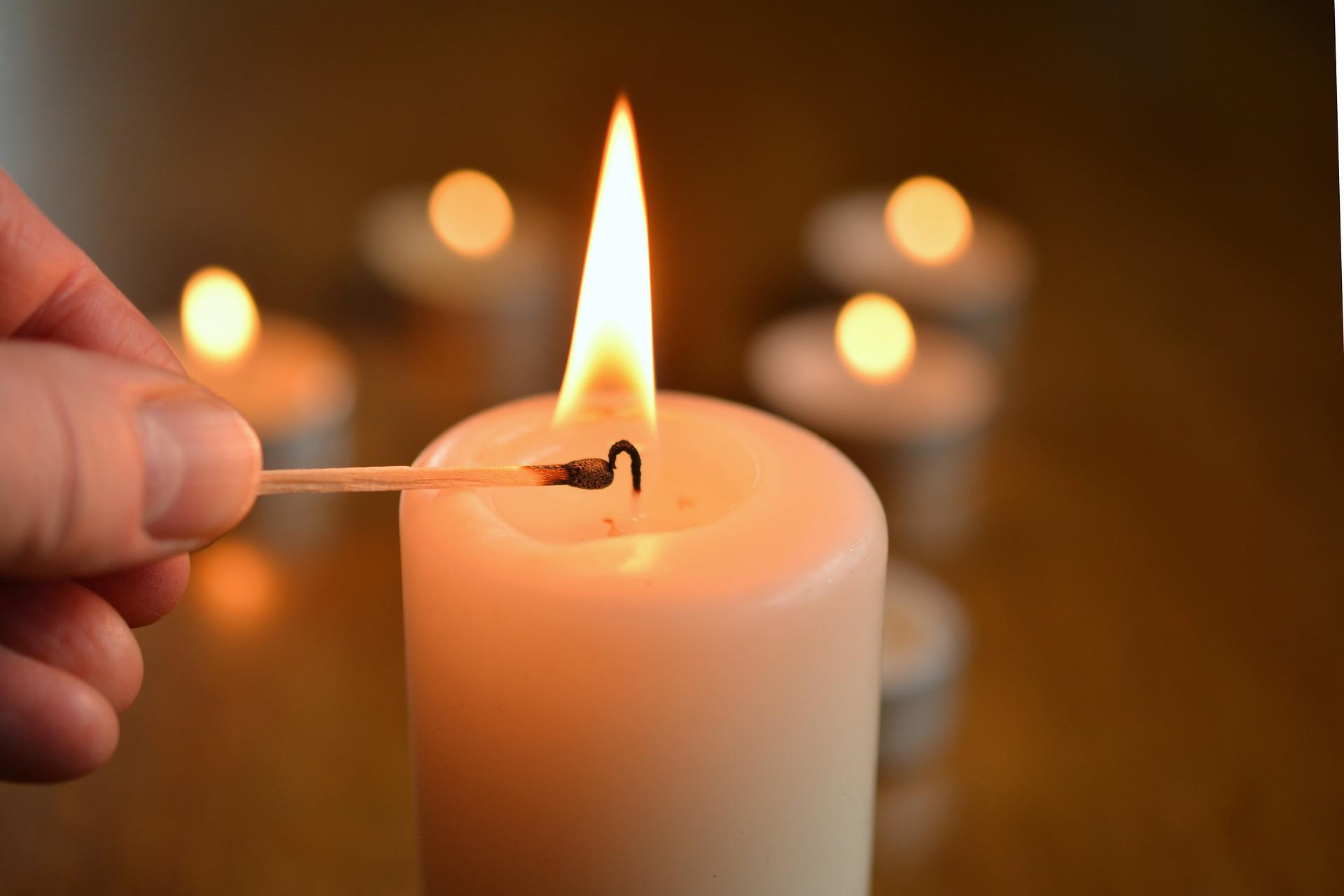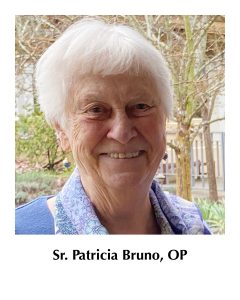- All
- Wisdom
- We Stand on Their Shoulders
- Vocation
- Uncategorized
- Stories Seldom Heard
- Spirituality
- Social Justice
- Prayer
- Peace
- Oneness
- Love
- Letting Go
- Lent
- Joy
- Inspirational Images
- Hope / Healing
- Holy Week
- Gratefulness
- God's Presence
- General News Stories
- Forgiveness
- Finding God
- Faith
- Easter
- Dominican Saints
- Discipleship
- Courage
- Christmas
- Catholic Sisters Week
- Care of the Earth
- Blessing
- Beauty
- Advent
- #justiceOPportunity
The Man Born Blind – John’s Gospel Chapter 9: 1-41
Sr. Patricia Bruno, OP

274th Edition – May 2022
 Even though it is May, I still hear the echo of “Christ our light” from the Easter Vigil service. Some parishes because of weather or other circumstances might modify the service, but the memory of the lighting of the “new fire,” the entrance of the paschal candle into a darkened church and the solemn chant “Christ our light” even now, in May, stir my spirit. As we lit our candles from the Paschal flame, we symbolically committed ourselves to follow Christ’s path and be disciples of light for the world. Each day the shadow of violence hovers over our world. We are horrified by the images we see and the reports we hear. However, our declaration at Easter, “Christ our light,” stands firm and strong against the darkness of sin and war.
Even though it is May, I still hear the echo of “Christ our light” from the Easter Vigil service. Some parishes because of weather or other circumstances might modify the service, but the memory of the lighting of the “new fire,” the entrance of the paschal candle into a darkened church and the solemn chant “Christ our light” even now, in May, stir my spirit. As we lit our candles from the Paschal flame, we symbolically committed ourselves to follow Christ’s path and be disciples of light for the world. Each day the shadow of violence hovers over our world. We are horrified by the images we see and the reports we hear. However, our declaration at Easter, “Christ our light,” stands firm and strong against the darkness of sin and war.
We might not have a church full of candles to remind us of our commitment to Christ and the power of his light to shine through us, but Brother David Steindl-Rast reminds us of the power of lighting one candle. “The very act of lighting a candle is a prayer” (1). The simple practice of lighting a candle with intention can help us focus on the Light of Hope instead of despair, the Light of Compassion that replaces isolation, and the Light of Mercy that opens our eyes to the presence of grace in our lives. “The very act of lighting a candle” witnesses our commitment to resist the darkness of conflict, violence, and poverty that covers so many places in our world. “The very act of lighting a candle” is a sign of our desire, like the man born blind, to see clearly.
The man born blind is more than a story of his blindness. It reveals the blindness of Jesus’ disciples, the temple priests, the man’s family, and neighbors. The man’s blindness is a state of being, not an ethical statement about his sinful behavior. Because of that, it is our story too, since “blindness” whether physical or spiritual, is a part of the human condition. Often, we who think we have sight deceive ourselves.
The passage is long and complicated. The first surprise is that the blind man never asks for sight, but Jesus heals him. This healing changes the blind man’s life which begins a list of conflicts. Before the man received his sight, his life was difficult, but it was simple and predictable. Once he became sighted, he finds himself and his family at the center of a harsh temple dispute.
As the story continues, it exposes the blindness of those in the story and raises many questions. It also questions us as to how well we see. The neighbors’ blindness is unusual. Why are they not sure the cured man is the one “who used to sit and beg?” Is it because he lacked social status that his neighbors overlooked him? When they gave “the beggar” some coins, did they not look at his face? Did they identify him only by his disability? Perhaps here we should stop and ask ourselves how well we see those who live on the periphery of our lives? Do we ever take time to notice them or speak to them? How good is our sight when it comes to seeing as Jesus sees the blind man?
The disciples’ question reveals the blindness of one of their religious beliefs. In their tradition, illness and misfortune were considered signs of God’s disfavor and punishment for some sin the person or family had committed. We hear this attitude expressed when the disciples question Jesus: “Rabbi, who has sinned this man or his parents…?” We hear it again boldly stated in the harsh judgment of the temple priests. But this judgment is not limited to their society. We hear this attitude expressed even today. Sometimes when bad things happen to good people some people question: “Why is God punishing me? I go to church. I say my daily prayers. I serve at the soup kitchen in our parish. What have I done to deserve this?” Even though we know that prayer and good works are not magic potions that protect us from personal or communal disappointments, pain, and suffering, we sometimes hear these questions.
The blindness of the priests is particularly troubling. They are the wise ones in their religious tradition. What is behind their lack of insight? The newly sighted man’s dialogue with the priests and his questioning of them are bold. He challenges the priests to engage Jesus in a conversation to find out who he is and from where he comes. Why do the priests not take up his challenge? Why do they not seek Jesus out to question him? Is it fear that holds them back? Do they fear losing their authority? Are they, like the parents of the man, afraid they will be ostracized from their temple community and their families? Is the cost of sight, believing in Jesus, too great a price to pay for the truth? Even for us blindness has its advantages. Often seeking the truth in difficult situations, whether it concerns world events or making decisions in our own personal lives, can be painful. The truth might set us free to be more authentic, but are we willing to pay the price?
The blind man’s story is more than just a miracle story. He is a teacher and fellow disciple. As we listen to the story, we begin to understand along with him how important it is to listen carefully to Jesus and trust his words. Without knowing who Jesus is, the man allows this stranger to touch him and put mud on his eyes. When Jesus tells him to go to the pool of Siloam, he goes. Perhaps it is because he is in great need, but his docility is courageous. As he goes through the cleansing process, the harsh conversations with his parents and the priests, his integrity shines. He speaks only the truth he knows. Step by step, small revelations lead him to the One who is the Truth. As we listen to his story, we hear the voice of a true disciple who also questions us. Can we recognize and trust the voice of the One who leads us to clarity of vision?
In one way the story of the unnamed man who receives his sight is a sad story. His experience is confusing and bittersweet.
Bitter: at a moment when everyone should be rejoicing, he finds himself alone and alienated from his former life. His whole life has changed. What was once so predictable is now complicated. No longer can he support himself by begging. No longer will his parent take responsibility for him. No longer can he claim blindness as a reason for inaction. In the midst of this confusing and isolating situation, he stands alone. “They drove him away (from the temple).”
Sweet! Jesus seeks him out and finds him. Jesus asks, “Do you believe in the Son of Man?” His answer is clear, “’ Lord, I believe’ … “and worshiped him.”
As we ponder this story, we might want to ask ourselves a few more questions. What is the experience of being born blind? What is it like to live in a world that most people will never experience? What is it like to be born into a situation that we believe can never change?
“The very act of lighting the candle is prayer.” As we light our candles during this Easter season, we pray for sight, insight, and a listening heart. “Eyes see only light, ears hear only sound, but a listening heart perceives meaning” (2).
- Brother David Steindl-Rast, a Benedictine monk, was born in Vienna, Austria. He is internationally known for his active participation in interfaith dialogue and his insights on the interaction between spirituality and science.
- Brother David Steindl-Rast
